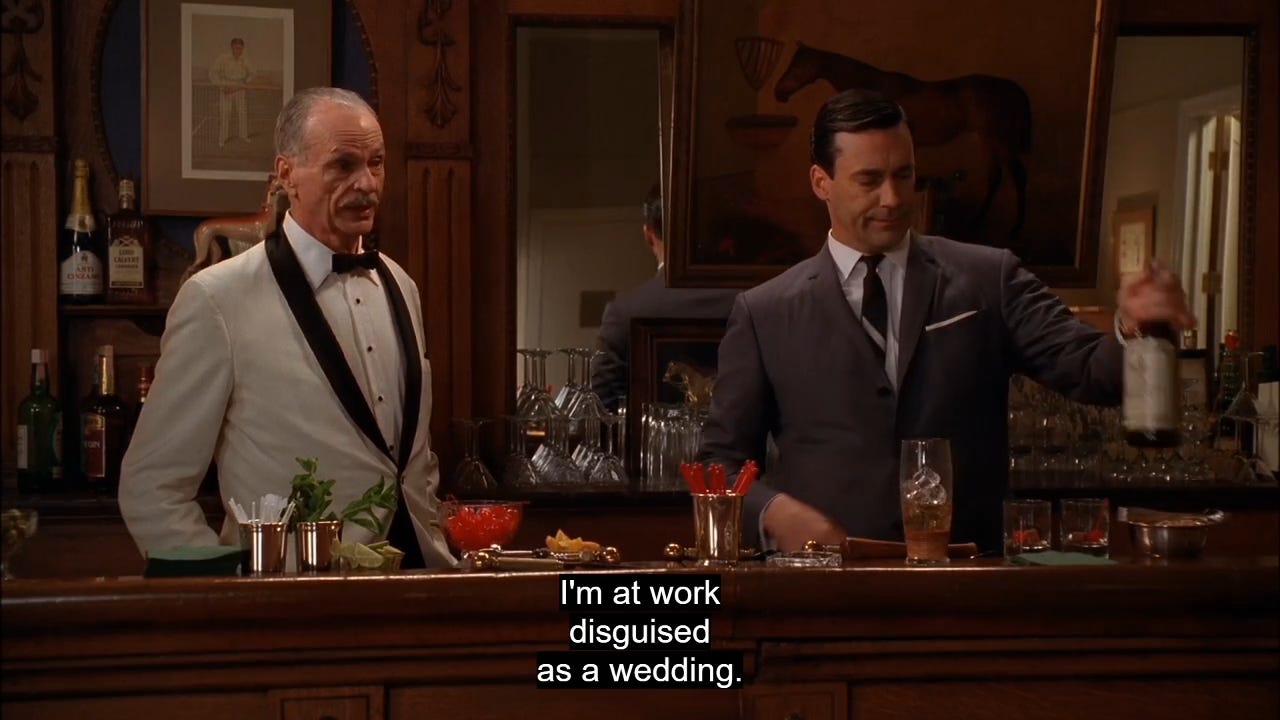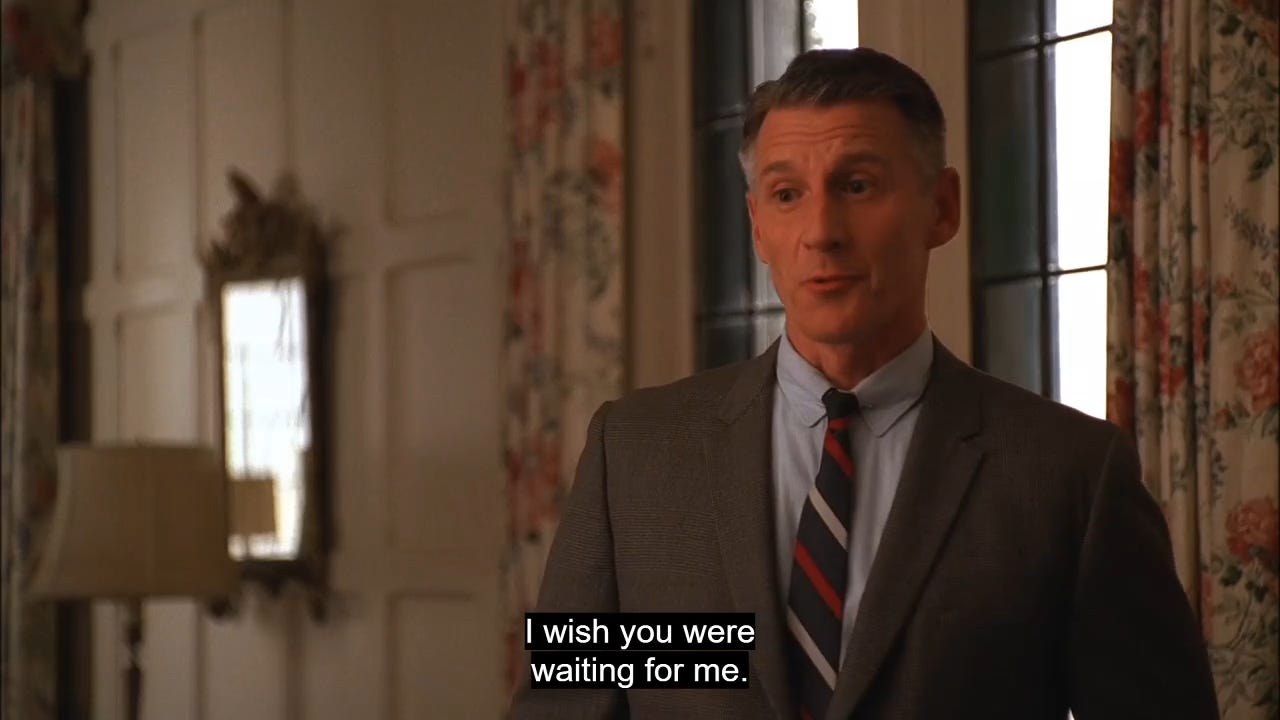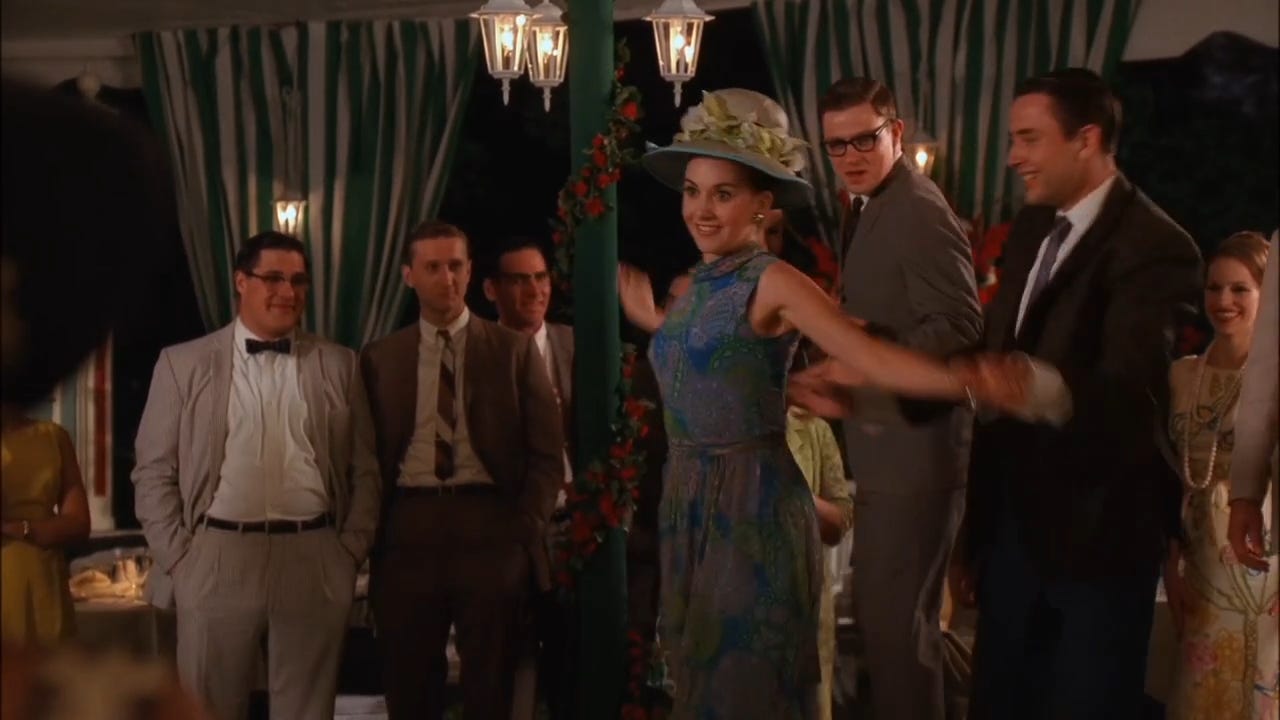Season 3: Episode 3
“My Old Kentucky Home”
Written by Dahvi Waller & Matthew Weiner
Directed by Jennifer Getzinger
Setting: May 4th, 1963
“There was a lot of controversy in the writers’ room. A lot of the writers were like, ‘you can’t do this.’ I was like, ‘Well, I think that season takes place in 1963 and blackface was not removed from the Philadelphia Police Parade until 1968 or something.’ That episode is about white people and what they’re like when they’re alone. We have a very diverse crew, and everyone understood what was happening, that it was a period piece, and it was not pleasurable for anyone. It was so well established that this was a part of the framework of that time, and it was so clear that we were criticizing it, but we had to live through doing it to criticize it.”
- Matthew Weiner, 2015 tribute to Mad Men at Alice Tully Hall at Lincoln Center
“My Old Kentucky Home” is one of Mad Men’s most infamous and necessary episodes. Since 2020, the episode has been introduced on streaming with this message:
In 2020, a movement began for streaming services to remove, amend, or add a disclaimer to episodes that featured blackface. Notably, the episode “Advanced Dungeons and Dragons” from the show Community was removed from Netflix and Hulu for a scene that featured a character wearing black bodypaint to portray a dark elf.
The episode, often considered Community’s best, became its rarest online due to a scene that was not intended to continue a shameful history in the entertainment industry.
Racism is in our history and to wipe that history away is to obscure the painful past we must learn from. Mad Men’s disclaimer for Roger Sterling’s blackface performance is the right way to present what most white people found normal “entertainment” in 1963. Just because a film or show portrays something does not mean it condones it.
There are three performances in this episode that all represent a defining ugly aspect of 1960s culture:
1. Roger Sterling’s Minstrel Show: This performance represents racism. During a Kentucky Derby party, Roger puts on blackface and sings “My Old Kentucky Home” for his young wife Jane. The crowd of elite society WASPs love it except for Don and Pete. Don most likely thinks that Roger is demeaning himself and his issue is not with the blackface demeaning others. Racism brings joy to these guests and the few who dislike the minstrel show stay silent. Silence preserves a distorted past.
2. Joan the Jester: This performance represents the submissive wife & dominant husband, the expected family life of the 60s. We know some of the couples on this show are doomed but the one that fills the viewer with absolute dread as we await that end is Joan and Greg. Any scene of them serves as a painful reminder of her rape in the previous season. The usually confident and in control Joan is under his thumb and resisting makes him press down further. After a stiff dinner party where Greg’s hospital coworkers joke about a patient who died under Greg’s watch, he insists that Joan distract the guests with an accordion performance. Joan reluctantly agrees and puts on a show of a beautiful and loving relationship filled with talent and respect. Greg and Joan are more focused on the illusion of happiness than happiness, which neither can offer the other. He does not want her to perform because he enjoys it but because it is a distraction from a life where he is not in control. His attempts for control just further crack their relationship.

3. Paul Kinsey’s Armageddon: This performance represents insecure masculinity. During a weekend slump in the office, Paul Kinsey calls his drug dealer to supply marijuana. Peggy, who has never smoked, joins him and has the ideal creative experience. She is inspired and confident whereas Kinsey is on the floor in desperation. He smokes weed as an escape and an extension of the pseudo-intellectual persona he exudes. What he believes makes himself cool and unique instead causes a breakdown over how his image is seen now and was perceived back in college. Kinsey is always trying to be something greater and getting high reveals the desperation of that act. When he puts a pipe in his mouth, he is not Orson Welles. When Peggy gets high, she is Peggy Olson.
The episode is about pretending and this theme is woven through each story from the elite upper-class partying in a country club to the worker bees stuck in a high-rise on Saturday. Don Draper, who has been at the bottom and top, understands that everyone is pretending.
This fact sickens him even though he is often a participant.

The episode is our introduction to one of the rare real-life figures featured on Mad Men, Conrad Hilton the founder of the Hilton hotel chain. Don teaches that the best connections come naturally. People of Hilton’s stature can smell desperation and I’m sure the wedding he attended had hopeful business deals thrown at his feet.
He respects Don for being himself and wants to work with him.
Don Draper wants a drink, there is no attempt to ask Connie what his line of work is or to pitch himself. For a man who lies as easily as he breathes air, Don is at his best being honest. As someone who walked into the life of another, it is easy for him to see when someone is being untrue to who they are. He can befriend almost anyone but they have to be their honest self.
The episode will still end with Don pretending.
Betty experiences honesty on the flip side of this when she meets her future husband Henry Francis.
From the moment they meet, Henry lets Betty know what he wants. Ironically, a politician is one of the few honest men on the show and his politics are patience. Henry is immediately attractive to Betty because he is the anti-Don, always thinking ahead rather than living in the moment.
She is shown the kindness of someone who thinks about what her life must be like rather than how she can be an accessory to his. Betty has never known anyone like this.
Don’s honesty wins him a meeting with Conrad Hilton.
Henry’s honesty earns a growing place in Betty’s heart. When a divorce comes, he’ll be waiting.
Honesty and authentic behavior are rewarded whereas disgusting performance lingers for years. At home, Sally learns an important lesson in this when she steals $5 from her grandfather. After returning it, she is accepted by him with love and understanding.
To continue a lie and wear a mask is a worse fate than accepting a harsh reality. We cannot ignore an ugly past. Understanding what came before makes a more beautiful future possible.
Don and Betty return to their pretend lives as the episode ends, kissing in the shadows as if they were strangers. These performances of racism, the submissive wife, and the insecure male define the 1960s in our memories and serve as a guide on how not to live your life in the future we build.
To be yourself is the greatest gift you can give to another person as honesty will make you both flourish.
The evils of inequality and a society that laughs and cheers as a white man darkens his skin to sing of the past he misses must not be forgotten. The past is ugly. It is filled with dancing and good memories too… but just because the music was playing and people were smiling does not mean this was good.
In 1963, America was pretending that the past was better and simpler. Any demand for change was an insult to this belief. Life should be more like the past!
Seeing the past as always better is not honest. We should remember it and that means all of it.
For those who made change for the betterment of all, we must not forget the ugly aspects of the past they fought to correct.













